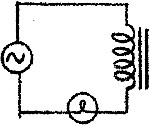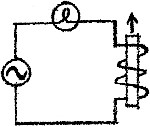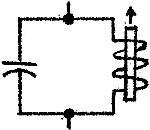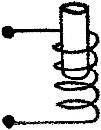|
September 1961 Popular Electronics
 Table
of Contents Table
of Contents
Wax nostalgic about and learn from the history of early electronics. See articles
from
Popular Electronics,
published October 1954 - April 1985. All copyrights are hereby acknowledged.
|
Have you ever heard
of a "swinging choke?" I surely hadn't, so my probability of getting Inductance
Quiz, which appeared in a 1961 issue of Popular Electronics magazine, question
number 5 correct was 50% at best. I guessed wrong - just my luck. As a result my
score was 8/9 = 89%. Oh, the shame. Maybe you will have a better time of it. Be
careful with Q6 as well. Otherwise, if you understand the fundamentals of inductor
circuit analysis, you will have no problem. Bonne chance.
Inductance Quiz
Inductance, as you may know, is the electrical property frequently compared to mechanical
inertia. To gauge your "inductance" knowledge, solve the problems below, then check
your answers.
By Robert P. Balin
|
 1 - The larger the resistance, the
greater the voltage developed on opening the switch. 1 - The larger the resistance, the
greater the voltage developed on opening the switch.
True
False
 3 - Increasing the supply frequency
will cause the lamp to glow more brightly. 3 - Increasing the supply frequency
will cause the lamp to glow more brightly.
True
False
 5 - The inductance of a "swinging"
choke decreases as the current through it increases. 5 - The inductance of a "swinging"
choke decreases as the current through it increases.
True
False
 7 - The lamp will glow more brightly
as the iron core is moved out of the coil. 7 - The lamp will glow more brightly
as the iron core is moved out of the coil.
True
False
 9 - The tuning slug on an oscillator
coil is most withdrawn at the top end of the band. 9 - The tuning slug on an oscillator
coil is most withdrawn at the top end of the band.
True
False
|
 2 - Current will continue to flow,
even after the supply voltage has dropped to zero. 2 - Current will continue to flow,
even after the supply voltage has dropped to zero.
True
False
 4 - Bunching a number of turns together
in a coil will increase its inductance. 4 - Bunching a number of turns together
in a coil will increase its inductance.
True
False
 6 - Inserting a brass-tipped tuning
wand into a coil will increase its inductance. 6 - Inserting a brass-tipped tuning
wand into a coil will increase its inductance.
True
False
 8 - Since a bifilar winding is "doubled
back" on itself, it boosts inductance. 8 - Since a bifilar winding is "doubled
back" on itself, it boosts inductance.
True
False
|
See answers below.
Quizzes from vintage electronics magazines such as Popular
Electronics, Electronics-World, QST, Radio-Electronics,
and Radio News were published over the years - some really simple and others
not so simple. Robert P. Balin created most of the quizzes for Popular
Electronics. This is a listing of all I have posted thus far.
- Oscillator
Quiz, November 1962 Popular Electronics
- Vacuum Tube Quiz,
February 1961 Popular Electronics
- Kool-Keeping Kwiz, June
1970 Popular Electronics
- Find the Brightest
Bulb Quiz, April 1960 Popular Electronics
-
Where Do the Scientists Belong? - Feb 19, 1949 Saturday Evening Post
- Quiz
on AC Circuit Theory, December 1970 Popular Electronics
- Magnetic
Phenomena Quiz, February 1962 Popular Electronics
- Electronics
Geography Quiz, April 1970 Popular Electronics
- Electronic
Menu Quiz, August 1963 Popular Electronics
- Electronic
Noise Quiz, August 1962 Popular Electronics
- Electronic
Current Quiz, October 1963 Popular Electronics
- Electronic
Inventors Quiz, November 1963 Popular Electronics
- Resistor Function
Quiz, January 1962 Popular Electronics
- Electronic
Measurement Quiz, January 1963 Popular Electronics
- Electronic
Coupling Quiz, August 1973 Popular Electronics
- Electronics
Analogy Quiz, August 1960 Popular Electronics
- Audio Quiz, April
1955 Popular Electronics
- Electronic Unit
Quiz, May 1962 Popular Electronics
- Capacitor
Circuit Quiz, June 1968 Popular Electronics
- Meter-Reading
Quiz, June 1966 Popular Electronics
- Electronic
Geometry Quiz, Jan 1965 Popular Electronics
- Electronic
Factor Quiz, November 1966 Popular Electronics
- Electronics
Math Quiz, November 1965 Popular Electronics
- Series Circuit
Quiz, May 1966 Popular Electronics
- Electrochemistry
Quiz, Mar 1966 Popular Electronics
- Biz
Quiz: Test Your Sales Ability - April 1947 Radio News
- Electronic
Analogy Quiz, Nov 1961 Popular Electronics
- Diode Quiz, July
1961 Popular Electronics
- Electronic
Curves Quiz, Feb 1963 Popular Electronics
- Electronic
Numbers Quiz, Dec 1962 Popular Electronics
- Energy Conversion
Quiz, April 1963 Popular Electronics
- Coil Function
Quiz, June 1962 Popular Electronics
-
Co-Inventors Quiz - January 1965 Electronics World
-
"-Tron" Teasers Quiz - Oct 1963 Electronics World
- Polarity Quiz
- March 1968 Popular Electronics
-
Television
I.Q. Quiz - Oct 1948 Radio & Television News
- Amplifier Quiz
Part I - Feb 1964 Popular Electronics
- Semiconductor
Quiz - Feb 1967 Popular Electronics
- Unknown
Frequency Quiz - September 1965 Popular Electronics
- Electronics
Metals Quiz - Oct 1964 Popular Electronics
- Electronics
Measurement Quiz - August 1967 Popular Electronics
- Vector-Circuit
Matching Quiz, June 1970 Popular Electronics
- Inductance
Quiz, September 1961 Popular Electronics
- RC Circuit Quiz,
June 1963 Popular Electronics
|
-
LCR Circuits Quiz - November 1969 Electronics World
- Amplifier Quiz
Part 2 - March 1964 Popular Electronics
- Amplifier
Quiz Part 1 - February 1964 Popular Electronics
- Three
Letter Quiz - January 1964 Popular Electronics
-
Electromagnetic Function - June 1964 Popular Electronics
-
Electronic Sticklers - February 1959 Popular Electronics
-
Bio-Electronic Quiz - July 1964 Popular Electronics
- Transformer Quiz
- April 1962 Popular Electronics
- Oscilloscope
Quiz - October 1961 Popular Electronics
- Roundword Puzzle
- January 1961 Popular Electronics
- Electronic
Sticklers - April 1959 Popular Electronics
-
What's Your EQ? - August 1966 Radio-Electronics
-
What's Your EQ? - February 1966 Radio-Electronics
-
What's Your EQ? - September 1962 Radio-Electronics
- Electronic Sticklers
- May 1959 Popular Electronics
-
What's Your EQ? - February 1963 Radio-Electronics
-
What's Your EQ? - April 1964 Radio-Electronics
-
What's Your EQ? - October 1966 Radio-Electronics
-
What's Your EQ? - June 1963 Radio-Electronics
-
What's Your EQ? - July 1966 Radio-Electronics
-
What's Your EQ? - December 1966 Radio-Electronics
-
What's Your EQ? - October 1964 Radio-Electronics
-
What's Your EQ? - July 1963 Radio-Electronics
-
What's Your EQ? - March 1966 Radio-Electronics
-
What's Your EQ? - November 1966 Radio-Electronics
-
What's Your EQ? - October 1966 Radio-Electronics
-
What's Your EQ? - May 1966 Radio-Electronics
-
What's Your EQ? - January 1966 Radio-Electronics
-
What's Your EQ - July 1966 Radio-Electronics
-
What's Your EQ? - December 1966 Radio-Electronics
-
What's Your EQ? - October 1964 Radio-Electronics
-
What's Your EQ? - June 1963 Radio-Electronics
-
R-E Puzzler - June 1967 Radio-Electronics
-
What's Your EQ? - January 1963 Radio-Electronics
-
Do You Know the Law? - Nov 1963 Radio-Electronics
-
What's Your EQ? - November 1962 Radio-Electronics
-
What's Your EQ? - September 1966 Radio-Electronics
- Radio
WittiQuiz - October 1938 Radio-Craft
-
What's Your EQ? - November 1964 Radio-Electronics
-
What's Your EQ? - February 1964 Radio-Electronics
-
What's Your EQ? - July 1967 Radio-Electronics
-
What's Your EQ? - December 1962 Radio-Electronics
-
What's Your EQ? - April 1966 Radio-Electronics
-
What's Your EQ? - October 1963 Radio-Electronics
-
What's Your EQ? - July 1964 Radio-Electronics
- Radio
WittiQuiz - November 1937 Radio-Craft
-
What's Your EQ? - May 1967 Radio-Electronics
-
What's Your EQ? - July 1962 Radio-Electronics
-
What's Your EQ? - January 1962 Radio-Electronics
-
What's Your EQ? - February 1962 Radio-Electronics
-
What's Your EQ? - March 1962 Radio-Electronics
-
What's Your EQ? - July 1961 Radio-Electronics
-
What's Your EQ? - August 1961 Radio-Electronics
-
Can You Name These Strange Electronic Effects? - August 1962 Radio-Electronics
-
What's Your EQ? - September 1961 Radio-Electronics
-
What's Your EQ? - September 1962 Radio-Electronics
-
What's Your EQ? - October 1961 Radio-Electronics
- Radio
WittiQuiz - December 1937 Radio-Craft
-
What's Your EQ? - November 1961 Radio-Electronics
-
What's Your EQ? - March 1964 Radio-Electronics
-
What's Your EQ? - April 1962 Radio-Electronics
-
What's Your EQ? - May 1962 Radio-Electronics
-
What's Your EQ? - June 1962 Radio-Electronics
-
What's Your EQ? - April 1967 Radio-Electronics
-
What's Your EQ? - March 1967 Radio-Electronics
-
What's Your EQ? - December 1964 Radio-Electronics
-
What's Your EQ? - January 1967 Radio-Electronics
-
Wanted: 50,000 Engineers - Jan 1953 Popular Mechanics
-
What's Your EQ? - August 1964 Radio-Electronics
- Voltage Quiz
- December 1961 Popular Electronics
-
What is It? - June 1941 Popular Science
- What Do You Know
About Resistors? - April 1974 Popular Electronics
-
What's Your EQ? - September 1963 Radio-Electronics
- Potentiometer Quiz - Sep
1962 Popular Electronics
-
Mathematical Bafflers - March 1965 Mechanix Illustrated
- Op Amp Quiz -
October 1968 Popular Electronics
- Electronic "A"
Quiz - April 1968 Popular Electronics
-
What's Your EQ? - May 1961 Radio-Electronics
-
Popular Science Question Bee - Feb 1939 Popular Science
-
What is It? - A Question Bee in Photographs - June 1941 Popular Science
-
What's Your EQ? - June 1961 Radio-Electronics
-
What's Your EQ? - June 1964 Radio-Electronics
-
What's Your EQ? - May 1964 Radio-Electronics
-
What's Your EQ? - August 1963 Radio-Electronics
-
What's Your EQ? - May 1963 Radio-Electronics
- Bridge
Function Quiz - Sep 1969 Radio-Electronics
-
What's Your EQ? - March 1963 Radio-Electronics
-
What's Your EQ? - February 1967 Radio-Electronics
-
Circuit Quiz - June 1966 Radio-Electronics
-
What's Your EQ? - June 1966 Radio-Electronics
- Electronics
Mathematics Quiz - June 1969 Popular Electronics
- Brightest
Light Quiz - April 1964 Popular Electronics
-
What's Your EQ? - April 1963 Radio-Electronics
- Electronics "B" Quiz
- July 1969 Popular Electronics
- Ohm's Law Quiz
- March 1969 Popular Electronics
-
Antenna Quiz - November 1962 Electronics World
- Color Code Quiz
- November 1967 Popular Electronics
- CapaciQuiz
- August 1961 Popular Electronics
- Transformer
Winding Quiz - Dec 1964 Popular Electronics
-
Audiophile Quiz - November 1957 Radio-electronics
- Capacitor
Function Quiz - Mar 1962 Popular Electronics
- Greek Alphabet
Quiz - December 1963 Popular Electronics
- Circuit
Designer's Name Quiz - July 1968 Popular Electronics
-
Sawtooth Sticklers Quiz - Nov 1960 Radio-Electronics
-
Elementary
Radio Quiz - December 1947 Radio-Craft
- Hi-Fi
Quiz - October 1955 Radio & Television News
- Electronics Physics
Quiz - March 1974 Popular Electronics
- A Baffling Quiz
- January 1968 Popular Electronics
- Electronics IQ
Quiz - May 1967 Popular Electronics
- Plug and Jack
Quiz - Dec 1967 Popular Electronics
- Electronic
Switching Quiz - Oct 1967 Popular Electronics
- Electronic
Angle Quiz - Sep 1967 Popular Electronics
- International
Electronics Quiz - July 1967 Popular Electronics
- FM Radio
Quiz - April 1950 Radio & Television News
- Bridge Circuit
Quiz -Dec 1966 Popular Electronics
- Diode Function
Quiz - August 1965 Popular Electronics
- Diagram Quiz,
August 1966 Popular Electronics
- Quist Quiz - November
1953 QST
- TV Trouble Quiz,
July 1966 Popular Electronics
- Electronics History Quiz,
Dec 1965 Popular Electronics
- Scope-Trace Quiz,
March 1965 Popular Electronics
-
Electronic
Circuit Analogy Quiz, April 1973
-
Test Your Knowledge of Semiconductors, August 1972 Popular Electronics
- Ganged Switching
Quiz, April 1972 Popular Electronics
- Lamp Brightness
Quiz, Jan 1969 Popular Electronics
- Lissajous
Pattern Quiz, Sep 1963 Popular Electronics
- Electronic
Quizoo, October 1962 Popular Electronics
- Electronic
Photo Album Quiz, March 1963 Popular Electronics
- Electronic
Alphabet Quiz, May 1963 Popular Electronics
- Quiz: Resistive?
Inductive? or Capacitive?, October 1960 Popular Electronics
|
Answers
1 - True. When the switch is opened, the inductance of the coil
tends to maintain the same value of current flow in the circuit. And the higher
the value of the series resistance, the greater the e.m.f. which will be developed.
2 - True. Since current lags voltage by 90 degrees in a purely
inductive circuit, current will continue to flow after the voltage has dropped to
zero.
3 - False. Because of the back e.m.f. induced in the coil as
the current through it changes, the greater the rate of current change, the greater
is the opposition to such change. Thus, the higher the frequency of the current
through the coil, the greater the inductance, and the smaller the voltage delivered
to the lamp.
4 - True. Closely spacing a number of turns in a coil will increase
the strength of its magnetic field and thus its inductance.
5 - True. A swinging choke is an inductor which is designed
to reach a maximum amount of magnetization or "saturation" at low values of rated
current. From this point on, an increase in the amount of current reduces the degree
of magnetization and hence the inductance. A greater portion of the source voltage
therefore becomes available to compensate for the larger resistive voltage drops
occurring within the power supply.
6 - False. Eddy currents induced in the brass will produce a
magnetic field which opposes that of the coil and thus effectively reduces the coil's
inductance.
7 - True. The iron core serves to increase the coil's inductance,
leaving only a small voltage available to light the lamp. Removing the core therefore
increases the voltage applied to the lamp.
8 - False. The current in this type of coil flows in opposite
directions in adjacent turns. Back e.m.f.'s of self-induction are produced in all
of the turns; but since the back e.m.f.'s of mutual induction will all have the
opposite polarity, they cancel out the back e.m.f.'s of self-induction and thus
make the coil "non-inductive."
9 - True. When the slug is moved out of the coil, the "core"
consists of air, and the inductance of the coil is decreased. Since the smaller
magnetic field is able to expand and contract at a faster rate, the coil is now
able to transfer its electrical energy into the resonating capacitor at a higher
frequency.
Posted October 6, 2020
(updated from original post on 5/15/2014)
|





 1 - The larger the resistance, the
greater the voltage developed on opening the switch.
1 - The larger the resistance, the
greater the voltage developed on opening the switch.  3 - Increasing the supply frequency
will cause the lamp to glow more brightly.
3 - Increasing the supply frequency
will cause the lamp to glow more brightly.  5 - The inductance of a "swinging"
choke decreases as the current through it increases.
5 - The inductance of a "swinging"
choke decreases as the current through it increases.  7 - The lamp will glow more brightly
as the iron core is moved out of the coil.
7 - The lamp will glow more brightly
as the iron core is moved out of the coil.  9 - The tuning slug on an oscillator
coil is most withdrawn at the top end of the band.
9 - The tuning slug on an oscillator
coil is most withdrawn at the top end of the band.  2 - Current will continue to flow,
even after the supply voltage has dropped to zero.
2 - Current will continue to flow,
even after the supply voltage has dropped to zero.  4 - Bunching a number of turns together
in a coil will increase its inductance.
4 - Bunching a number of turns together
in a coil will increase its inductance.  6 - Inserting a brass-tipped tuning
wand into a coil will increase its inductance.
6 - Inserting a brass-tipped tuning
wand into a coil will increase its inductance.  8 - Since a bifilar winding is "doubled
back" on itself, it boosts inductance.
8 - Since a bifilar winding is "doubled
back" on itself, it boosts inductance. 

